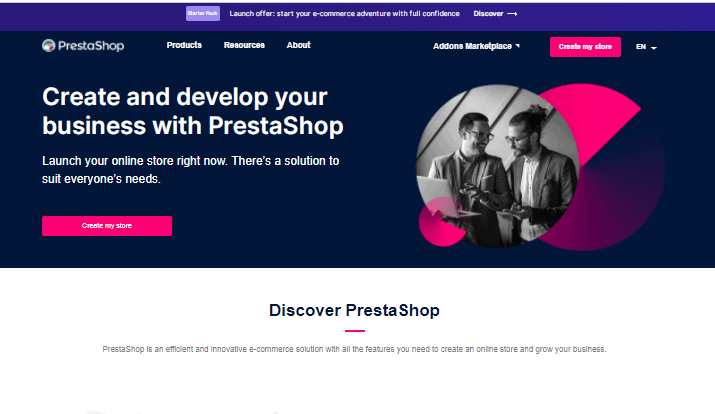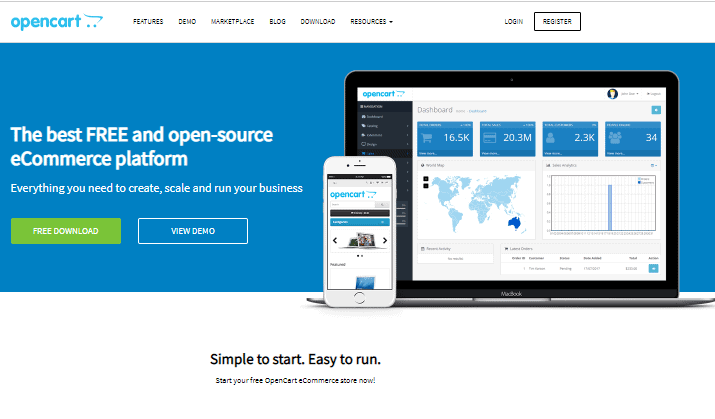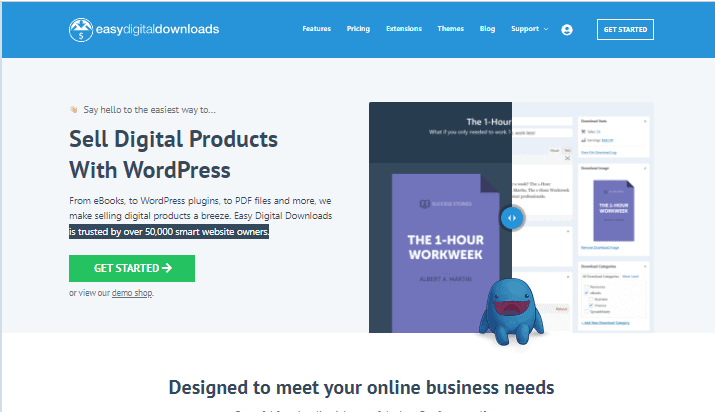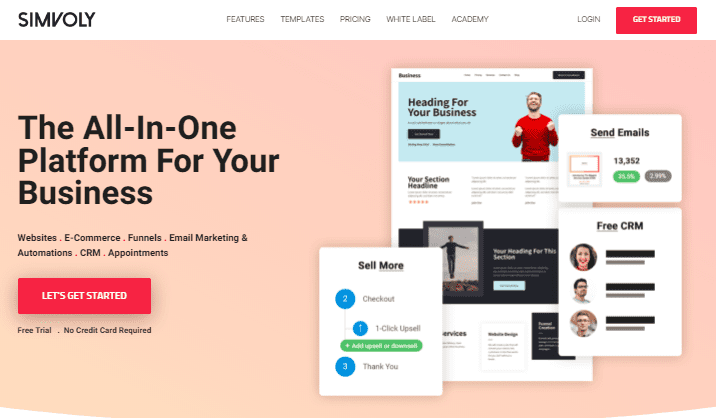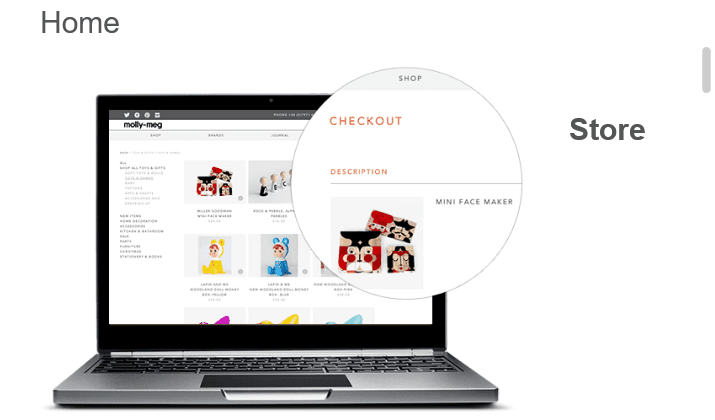WooCommerce is a powerful, fully-featured eCommerce plugin used widely by burgeoning businesses to sell online. It has advanced functionality and features to help list your products, receive payments, track and manage your inventory, and deliver your orders from one place.
Besides being free and open source, the plugin has a mobile app, and is secure, making it ideal for selling both digital and physical products. It also lets you customize things to suit your needs.
With built-in analytics, it will be easy for you to receive insights about your eCommerce store’s performance and customer behavior. WooCommerce also integrates with plenty of applications including SendGrid, SparkPost, Maligun, Mandrillto, and more to ensure smooth operations.
However, WooCommerce only works with WordPress and you have to pay for extensions. WooCommerce is also a little heavy and requires coding skills and experience to work with it.
If your business is operating on WordPress, you’ll be okay choosing WooCommerce. But if you are looking for particular features for your site that aren’t on WooCommerce, you may want to check out these alternatives.
Hop on and let’s check them out.
Best WooCommerce Alternatives
These eCommerce platforms have the solutions to help you achieve your business goals.
1. Ecwid
Ecwid boasts of approximately two million downloads in WordPress’ plugin directory. This makes it one of the best ways to add an eCommerce store to your site. The most exciting part is that you can access a free mobile app to use as POS thanks to its Shopping Cart.
Ecwid is partly a double whammy. You can use its plugin to include a store on your WordPress website. And not just that; you are also allowed to build your own basic store too.
This also presents the option to create links and sell directly on social media networks like Facebook, Instagram, Snapchat, Pinterest, and other commercial channels like eBay and Amazon. You basically take a multichannel approach to e-selling.
Such flexibility portrays Ecwid as a business model that focuses on empowering merchants to sell anything they want or have, wherever they want to. Ecwid lets you manage your inventory, restock, and track your sales from one central spot.
Ecwid isn’t so hard on the pocket. It is also beginner-friendly, with no coding headache when setting up your online store. Its order management interface, multichannel sales features, and centralized inventory are unmatched.
Unlike WooCommerce, Ecwid can be used outside of WordPress. Its ‘instant site’ feature lets you create a simple, independent eCommerce site. But you’ll need Ecwid’s plugin for WordPress features to enhance your site’s performance.
To reach its support team, you have options like phone, email, chat, and resources or documentation.
Ecwid is free to set up and launch your eCommerce store. The Venture Plan business plan costs $15/month, the Business plan at $35, and the Unlimited Plan at $99. The platform accepts in-person payments.
Also Read: Shopify vs Ecwid
2. Shopify
Shopify is an all-around eCommerce platform that gets you selling online as soon as you set it up. The platform has earned a name for itself as the best platform for selling anything from jewelry, cosmetics, and more. It fits into any business model easily.
Shopify is fully hosted, with no links to WordPress. Without any technical know-how, you can build your online store and start selling. You have all the tools needed to take control and manage your business, whether online or in-person.
Build your storefront to reflect your brand, embed all your products, and use secure payment options from leading gateways. Ideally, Shopify isn’t too technical; you can set it up easily without any hitches. Its themes, customizable designs, web hosting, and the rest of its features are all comprehensive.
The platform has a comprehensive dashboard with plenty of resources to use. The active community will get you through your hiccups in no time. And the sales ecosystem functions swiftly without any plugins.
As your business scales, so do your Shopify solutions. It’s no wonder many top eCommerce websites prefer it. Besides its superb usability, Shopify offers platform-based hosting plans so you only pay for what you use.
While WooCommerce requires a hosting account, software, updates, and backups to manage its hosting account, Shopify shoulders this burden by offering a fully hosted platform. The drag and drop tools are enough to get your store up and running in minutes. It’s an entirely hands-off solution with all the convenience you need.
It offers a 14-day free trial and three additional pricing plans including a Basic Plan at $29/month, Shopify Plan at $79/month, and Advanced Plan at $299/month.
Set up your ecommerce store, pick a plan later. Check special pricing for Shopify =>
3. Wix
Wix is renowned for its ease of use, top-notch templates, and unrivaled customization options. Like the other eCommerce platforms, Wix lets you manage your store across multiple sales channels, allowing you a variety of selling options.
The Wix Owner apps give you the privilege to offer subscriptions, source and dropship products, and track and monitor your store wherever you are. Establish your shipping and tax rules by location, track your orders, receive payments, and create coupon codes effortlessly with your app.
Wix supports different payment options including credit cards, PayPal, and more. You can automate sales tax, set membership payments, and do a whole lot more with Wix.
The platform’s customer support options include a 24/7 call-back service, community forum, and knowledge base.
Compared to WooCommerce, Wix is affordable as it doesn’t require more investments in other integrations or outsourced developer help.
Wix is an excellent, flexible option for cost-effective eCommerce businesses. It offers three pricing plans including Business Basic at $17/month, Business Unlimited at $25/month, and Business VIP at $35/month. Web hosting is included in each of its plans. There is no free trial.
With over 500+ customizable templates, free hosting, SEO tools, and round the clock customer support, Wix lets you create beautiful websites fast and easy!
4. BigCommerce
BigCommerce helps large businesses launch and grow their online stores. It has a few distinct features and built-in conversion and SEO tools to help with business growth.
This fully self-hosted platform has three steps to setting up and running your eCommerce store- build (build your storefront), run (run your daily inventory management and order processes, and grow (grow your business with practical insights and advice on how to optimize your site and maintain a successful eCommerce store).
It gives you access to plenty of built-in sales features and tools for eCommerce. With BigCommerce, you have an agile environment to grow and evolve while remaining relevant to its ever-changing needs. It also offers robust analytics to improve your operations and overall sales and profitability.
The platform comes with a neat dashboard, easy migration tools, flexible B2B payments, cross-channel commerce, promising infrastructure with 99.99% uptime, and excellent 24-hour customer support. It also has POS integrations and conversion tools.
It has a mobile app featuring view analytics, inventory and product management, customer search, and update orders. Its integrated sales channels include price comparison engines, Facebook, Google Shopping, eBay, Walmart, Etsy, Instagram, and Amazon.
BigCommerce has 24/7 technical support via chat, email, and phone.
While BigCommerce is an out-of-the-box solution, WooCommerce needs extra effort to get your eCommerce up and running.
It also includes web hosting and can solve even the most complex queries for large companies without needing any tweaks.
BigCommerce offers a 15-day free trial and three more pricing plans: A Standard Plan at $29.95/month, a Plus Plan at $79.95/month, a Pro Plan at $299.95/month, and an Enterprise Plan with custom pricing. Each plan includes website hosting.
Interesting Comparison: Squarespace vs Shopify vs BigCommerce
5. Volusion
Volusion is an old eCommerce platform provider with years of successfully helping small enterprises with their online stores.
It offers a free 14-day trial to give you a feel of the platform before committing. With Volusion, you’ll efficiently manage your inventory and know when it’s time to restock. The platform will always notify you when stocks are low.
Besides managing your inventory, you’ll be able to manage your store wherever you are through a mobile app provided by Volusion.
The platform also offers prompt reporting so you can get insights on your store’s performance including your inventory and purchases. The search bar feature allows customers to navigate your site without any problem.
Volusion’s customer management helps you with insights into customers’ activity and contact information.
Unlike WooCommerce, Volusion is a custom eCommerce platform that empowers you to create your online store without any coding.
For customer support, you can contact them through the chat system or head to their Help Center where you’ll find lots of resources on how to get started, how to grow your business, and much more.
The platform also gives you the option to add ‘Quick Wins’. This allows you a one-time fee on things like Google Analytics setup, image creation, YouTube video optimization, and much more. It also has free and paid themes.
Volusion offers four pricing plans. Its Personal Plan costs $29/month, Professional Plan at $79/month, Business Plan at $299/month, and the Prime Custom Plan which is available on quote.
6. Paperform
Paperform offers the easiest and fastest ways to sell online. You don’t need hosting, HTML code, or WordPress themes to use Paperform. It has built-in eCommerce features that provide an all-in-one solution for your store with just a fraction of the setup.
The easy-to-use dashboard lets you manage everything from one place. You can create your dedicated product pages with GIFs, videos, and images. Paperform also lets you manage your stock, set discount codes and SKUs, or use conditional logic to ensure a dynamic shopping experience for your customers.
With Paperform, you can customize your page with theming options, tweak the fonts, colors and even translate your site into various languages to attract a wide range of markets.
When selling digital items, you can take subscriptions, set up appointments and bookings for product calls, and even set up a paywall. Paperform also allows you to connect web apps and simplify your workflows.
And there’s more, you get to automate your email marketing, send customer data to your CRM, and use more than 3,000 integrations.
It has a Help Center with handy tutorials and 24-hour top-notch customer support.
Paperform is new but offers complex functionality and a beautiful front-end compared to WooCommerce. And you don’t need a complex setup process. Also, Paperform offers full access to its form builder without any restrictions.
Besides the 14-day trial, Paperform has three more pricing plans including the Essentials Plan at $24/month, a Pro Plan at $44/month, and an Agency Plan that costs $99/month.
7. PrestaShop
PrestaShop is an open source WordPress plugin with versatile customization opportunities for your eCommerce store. Its dashboard contains management and design tools to help you launch your store quickly. The various marketing functionalities are in-built.
PrestaShop lets you control everything about your store from the dashboard. It has an advanced multi-store system and an in-built inventory management section to help you monitor your stock efficiently.
With Prestashop, you can set geographical delivery zones according to those locations that your business serves.
PrestaShop supports +75 languages but WooCommerce requires you to install an extension to make it multilingual.
Using the advanced search option, customers can locate your products quickly before making a purchase.
Its customer support includes community support and dedicated paid support.
The best part about PrestaShop is that it’s a free platform.
Explore: Best Wordpress Alternatives
8. OpenCart
OpenCart is a free and open source eCommerce platform. It packs a lot of addons that you can use to integrate a number of features and functionalities into your store.
Its customization options are pretty advanced, with very neat usability. With OpenCart, you can generate your sales reports and get insights into your store’s performance analytics with much ease. To reach the extensive digital market you can use multiple languages and currencies that target audiences across the globe.
The platform incorporates multi store management into its interface, making it convenient when you own more than one eCommerce store.
Its customer support includes a paid ticket, dedicated support, community support, market support, and phone support.
One of OpenCart’s most impressive features is the backup and restore capability. You can easily choose the files to back up and set up restorations. You can’t back up with WooCommerce without the help of another plugin.
9. Magento
Magento is an open source tool with features to let you build and grow an online store. It’s flexible and secure. Magento allows you to segment customers, which makes personalizing marketing materials hassle-free.
Magento boasts a user-friendly interface that makes the administrative work easy to manage. What I like about Magento is its extensive ready-to-use extensions and templates available at its marketplace.
The Magento Marketplace has several categories to help you find an extension quickly. Examples of the categories include Marketing, Accounting & Finance, Site Optimization, Payments & Security, Sales, Shipping & Fulfillment, Reporting & Analytics, and Customer Support.
What gives Magento an edge over WooCommerce is that the former has a cloud-based solution ideal for bigger enterprises.
It’s known as Magento Commerce with additional features, such as Business Intelligence Dashboards, WYSIWYG Page Builder, Product Recommendations, Content Staging and Preview, Advanced Marketing Tools, Web Application Firewall, and more.
If you aren’t using Magento Commerce, then you should use Magento Open Source, which offers basic eCommerce capabilities, including Site Search, Global Selling, Instant Purchase, Catalog Management, Mobile Optimized Shopping, Integrated Checkout, Payment, and Shipping.
Magento Open Source is free for download, but Magento Commerce’s cost depends on your business needs and is quote-based.
10. Easy Digital Downloads
The plugin offers an easy and powerful means for selling digital products via your WordPress website. With this platform, you can sell eBooks, PDF files, WordPress plugins, and more.
Easy Digital Downloads comes with a full shopping cart that lets your customers buy multiple downloads all at once. Purchasing through the shopping cart is seamless, thanks to the cleanly designed cart elements and minimum page loads.
You can distribute your digital downloads without limits or restrict the activity by attempt or time. As customers download your products, they can pay via Stripe, credit card, Google Pay, PayPal, or Apple Pay. The tool allows you to set up recurring payments as well.
Do you want customers to buy more? You can achieve it by creating discount codes with this plugin. You can offer discounts as a percentage or flat rate and add settings for maximum use, expiration, and more.
You can use a shortcode to display a purchase history table that only logged-in customers can view. That means unauthorized users won’t have access. Besides, you can also monitor the customers’ download activity by tracking the time, date, and IP addresses of every purchased and downloaded file.
Easy Digital Downloads integrates with most platforms, including Stripe, Dropbox, PayPal, Slack, ConvertKit, Mailchimp, AWeber, AffiliateWP, and more.
In terms of performance, Easy Digital Downloads is more lightweight than WooCommerce. For instance, a fresh install of the latter loads eight scripts on the store page but Easy Digital Downloads’ fresh install only loads two scripts.
It gets better: You can easily integrate Easy Digital Downloads with AffiliateWP to create an affiliate program. The two plugins are designed by the same team, making it easy to set up an affiliate program so customers can start promoting your store.
You can download the plugin for free but you should upgrade to any of its premium plans to enjoy all the features. Personal Pass costs $99.50, Extended Pass $199.50, Professional Pass $299.50, and All-Access Pass $499.50.
11. Sellfy
Sellfy allows you to set up an eCommerce store in as few as fine minutes. You can create a store in a few clicks; you simply need to sign up, add various products, customize the store, and Voila! The site is live.
The platform comes with built-in marketing features that you can use to grow the business and sales. For example, you can up-sell, add discounts, or use their email service.
Sellfy makes selling on social media a breeze. I like this tool because you don’t incur transactional fees when making sales. It also comes with email marketing tools to increase the chances of conversion.
Sellfy works well for digital products. While you can still sell physical products, the platform doesn’t offer shipping and fulfillment. So, that means you may have to organize for product delivery.
If you want to sell digital products, Sellfy lets you create subscriptions where users can be charged on a yearly, monthly, or weekly basis.
Unlike WooCommerce that requires some coding skills when making changes to your website, you create and run a store on Sellfy without prior coding experience.
Sellfy offers a Free Plan and three paid plans: a Starter Plan at $19/month, Business Plan at $49/month, and Premium Plan at $99/month. There’s a 14-day free trial, too.
12. MemberPress
Unlike most eCommerce solutions on our list, MemberPress isn’t a store builder. It’s a plugin that lets you sell subscription-based products, such as courses, on your WordPress website.
It’s not only easy to set up, but also lets you restrict access to posts, pages, categories, child pages, custom post types, tags, and more.
MemberPress has built-in features that you can use to restrict access to specific content without paying extra. You can do the same with WooCommerce, but you’ll need to purchase a separate plugin for that role.
If you’d like to create a password-protected community, you can easily do it with MemberPress. The plugin integrates with many WordPress forum plugins, such as BBPress.
The other interesting feature with MemberPress is the ability to generate unique pricing pages for various membership products. You can change the order of products, adjust the feel and look, and edit the copy.
The plugin also features various pricing page themes, so you don’t need any HTML or CSS coding knowledge to customize the look of these pages.
MemberPress has three premium plans: Basic costs $179, Plus costs $299, and Pro costs $399.
13. Simvoly
Simvoly is both a website and funnel builder. The drag and drop system makes it easy to create an ideal landing page along with checkout.
It also comes with a lead magnet builder with stunning designs optimized for conversion and speed. Lead magnets are essential in lead generation.
Simvoly lets you increase orders with a single click upsell. Instead of adding billing details again, customers can purchase an extra product with one click.
Like MemberPress, Simvoly allows you to sell membership access where you only let paid customers access your courses or specific pages.
The other powerful features on this platform include 200+ block templates for easy page building, 200+ page templates, 900+ fonts, pop-up builder, global styling, 30+ widget elements, header builder, and shape dividers.
Simvoly comes with fully-fledged SEO capabilities to help you rank. The SEO features include image descriptions, meta titles and descriptions, header tag organization, schema, and more. Unlike WooCommerce, MemberPress creates super lightweight pages, thanks to the clean CSS3 and HTML5 design.
Simvoly’s pricing is reasonable. The Personal Plan costs $12/month, Business Plan costs $24/month, Growth Plan costs $79/month, and Pro Plan costs $199/month. They also offer a free trial for fourteen days.
14. Squarespace
The tool is perfect for building beautiful and professional eCommerce stores for creatives. You can upload images, apply to brands, add photos, and stock the store with products.
Squarespace has built-in eCommerce capabilities in all of its plans. In other words, you can set up a store on this platform and sell services or products, accept subscriptions, and use it as your POS (point of sale) solution.
On top of that, the tool has basic but effective tools for blogging and analytics. There are tons of flexible and user-friendly templates. You can choose a template depending on the store’s niche, such as gaming, technology, art, food, travel, jewelry, music, fashion, and more.
Unlike WooCommerce that requires you to install other plugins for full functionality, Squarespace is a complete package with features, such as blogging, analytics, SEO, email marketing, membership, appointments, checkout, and much more. There’s no need to install extra tools.
Squarespace has four premium plans that you can pay for annually or monthly. The annual option is cheaper, as you can save up to 30%. The Personal Plan costs $12, Business Plan $18, Basic Commerce $26, and Advanced Commerce $40 per month, charged annually.
15. WP eCommerce
This open source plugin lets you add eCommerce functionality to your WordPress site. Its main features are secure payments, shipping modules, analytics reporting, and tax management.
You can sell digital and physical products here, set up marketing automations, and create coupons. They offer live chat, a community forum, and video tutorials.
They have several addons, including Stripe, Gold Cart, Members & Subscription, Download Manager, Digital Downloads Importer, Authorize.net SIM, Square Payments, Amazon S3, and more.
WP eCommerce offers three different annual subscriptions. All add-ons cost $99 per single site, $175 for two to five websites, and $250 for unlimited websites.
Final Word
Ecwid is the best WooCommerce alternative because it comes with a mobile app. It lets you sell directly on social networks and big commercial platforms like Amazon and eBay.
It’s also cheaper than most tools mentioned above, it’s beginner-friendly, doesn’t require coding experience, and is compatible with both WordPress and non-WordPress sites.
Tom loves to write on technology, e-commerce & internet marketing. I started my first e-commerce company in college, designing and selling t-shirts for my campus bar crawl using print-on-demand. Having successfully established multiple 6 & 7-figure e-commerce businesses (in women’s fashion and hiking gear), I think I can share a tip or 2 to help you succeed.








